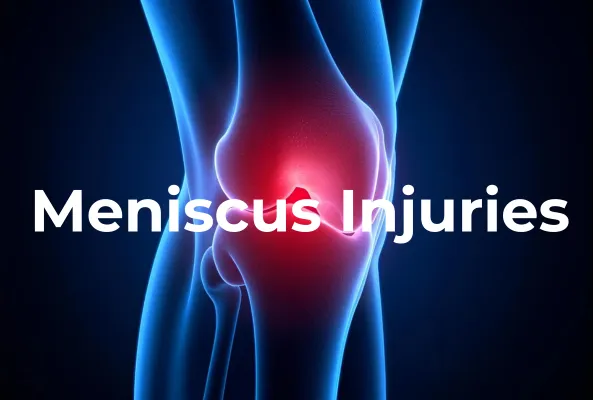Read our Blog

Meniscus Injuries
Meniscus Injuries: Surgery vs. Non-Surgical Rehab: What the Evidence Reveals
Introduction: Available Meniscus Tear Treatment
At Revive Physiotherapy we treat a variety of meniscus injuries. Once our clinical evaluation or an MRI confirms the diagnosis, the big question is: “Do I need meniscus surgery, or can I get back to normal activity with non-surgical rehabilitation?”
The answer can depend on a number of factors: your age, type of tear (degenerative vs. traumatic), symptoms (locking vs. aching), activity goals, and commitment to a structured program of rehabilitation.
In the last ten years or more, various high-quality trials and research have revolutionized the way clinicians manage meniscus tears, particularly degenerative meniscus tears in adults. Here is a summary of the latest research. Who benefits from surgery? Who thrives through rehab? How to make a self-assured, evidence-based decision.
Meniscus 101: Quick Refresher
The meniscus is a C-shaped cartilage that helps provide shock absorption to distribute load across the knee. Tears of the meniscus come in various types:
Degenerative tears (frequent from age 35 to 40):
Fraying or splitting of fibers from gradual strain and unequal force across knee.
Traumatic tears (common for younger or athletic populations):
Discrete injuries such as bucket-handle or radial tears.
Why this matters:
Young athletes with traumatic-type tears may require surgery to maintain the meniscal tissue and to secure preservation of the meniscus and future joint integrity.
Structured physical therapy for degenerative tears can usually turn up a successful response over the long term
RESEARCH Results:
1) Comparison between Physical Therapy and Surgery: Similar Long-Term Outcomes
The ESCAPE trial studied adult subjects with degenerative meniscus tears for 5 years. Results showed structured physical therapy was as effective as arthroscopic surgery for knee function, with no difference in arthritis progression.
Conclusion: Rehab can achieve similar long-term results as surgery for degenerative tears. [van de Graaf et al., JAMA Netw Open, 2022]
2) Surgery vs. Sham Surgery: No Great Benefit
In the FIDELITY trial, patients received either a real or sham surgery in which no tissue was removed. Both groups improved equally.
Conclusion: Removing meniscal tissue alone does not confer further advantages. [Sihvonen et al., NEJM, 2013]
3) Meniscus Tear and Mild Arthritis
The METEOR trial compared surgery to physical therapy in patients with a degenerative meniscus tear plus mild arthritis. The results showed comparable improvement at 6 months in both groups. Some PT patients settled on surgery, but many opted not.
Conclusion: PT is a reasonable first line of intervention, with surgery secondary. [Katz et al., NEJM, 2013]
4) Meta-Analyses: No Long-Term Benefit, Only Trivial Gains
Pooled data suggest surgery may offer short-term pain relief, but 2 years later, results are similar to physio.
Conclusion: Rehab offers the same pain relief outcomes as surgery without the downtime and invasive risk. (Siemieniuk et al., BMJ, 2017; Abram et al., Br J Sports Med, 2020; van de Graaf et al., Br J Sports Med, 2023)
5) Recent Studies (2022-2024)
New evidence: Exercise-based rehab can be as effective as surgery for degenerative meniscus tears, and its effect improves as time passes to year 1.
Key Theoretical Takeaway: If your knee isn’t locking and your primary symptoms are pain or stiffness, begin with a structured rehabilitation program. Surgery rarely outstrips good physical therapy in the long haul for meniscus tears.
When Surgery Might Be Necessary
Not all tears need surgery. Indications include:
Unresolved mechanical locking or catching.
Feeling like something is blocking the joint (like a doorstop).
Traumatic tears in younger patients where repair of the meniscus is viable to preserve force absorption, critical to long-term joint health and return to sport.
Progressive rehab fails on a fair trial (~3 months) if returning to high-demand sports is a goal.
Repair vs. Removal:
Repair (stitching tissue back) preserves the meniscus tissue and function.
Partial meniscectomy (removing tissue) helps relieve symptoms but raises the risk of long-term osteoarthritis. [SpringerOpen+1]
Benefits of a New Type of Rehab which You Can’t Get by Surgery Alone
Rehabilitation, even after surgery, is imperative. For many adults with degenerative tears, rehab alone can provide:
Load distribution and strength: Progressive exercise of the quadriceps, hamstrings, and glutes reduces joint stress.
Neuromuscular control: Balance, proprioception, gait retraining all help with alignment and function.
Range of motion and swelling control: With early motion and management of edema, stiffness prevention becomes possible.
Exercise education and self-management: activity modification and graded exposure help prevent flare-ups.
Key: In trials where PT and surgery outcomes could be comparable, both groups were rehabilitated; targeted exercises have been the answer to function long term. [Clinical Chest Journal]
Benefits and Trade-Offs: Surgery vs. Rehab
Potential benefits of surgery (right patients):
Fast treatment of mechanical symptoms.
Repair of traumatic tears saves tissue, protecting the health of joints. [SpringerOpen+1]
Trade-offs:
Recovery period and surgical risks (infection, DVT, anesthesia).
Removal of tissue may raise the risk of long-term osteoarthritis; degenerative tear outcomes are often of an indistinguishable quality from those associated with PT. [PMC+1]
Potential advantages of non-surgical rehab:
Similar functional outcome as surgery at 1–5 years. [PMC+1]
No surgical risk
Whole-body improvements: strength, balance, and movement patterns for long-term knee resiliency.
Trade-offs:
Requires regular engagement and commitment to program (8–12+ weeks).
Can’t fix the actual mechanical locking; surgery may be needed.
How To Decide What is Best For YOU
Ask your clinician:
What kind of tear is it?
Non-locking and degenerative → rehab first.
Traumatic with locking → surgical consult indicated.
What are your goals?
Daily function → Rehab is usually enough.
High-demand pivoting sports → Surgery might work better.
Did you complete full-course rehab?
Yes and still restricted → surgery can feel logical.
No → invest in your 8–12 week rehab program.
Bottom Line
Degenerative meniscus tears: Structured physical therapy reduces pain and improves function without compromising the integrity of the joint.
Traumatic with true mechanical locking: Surgery (preferably a repair) in some cases would be necessary when coupled with some high-quality rehab.
Progressive, criterion-based rehabilitation is the motor that brings out muscle, confidence, and longevity of the knee.
If you’ve been considering meniscus surgery versus rehab, we can help you decide. At Revive Physiotherapy, we couple evaluation with evidence-based rehabilitation and work with orthopedic surgeons when surgery is the better decision.
📞 Call or Text 954-519-4185
💻 Request an appointment with one of our orthopedic Physical Therapists
Re-engage with what you love.
Our one-on-one treatment sessions ensure that you fully understand your body and take ownership of your health so that you can have control over doing the things you love!
Send us a Message
Let's Have a Chat
954 - 519 - 4185
Find us at
2852 E Oakland Park Blvd
Fort Lauderdale, FL 33306
2024 REVIVE PHYSIOTHERAPY | ALL RIGHTS RESERVED

